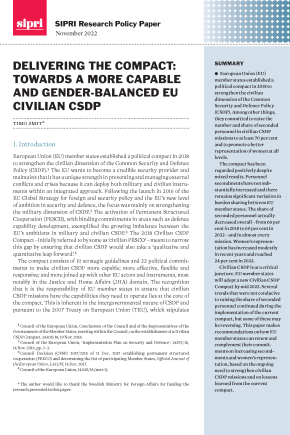Delivering the Compact: Towards a More Capable and Gender-balanced EU Civilian CSDP
European Union (EU) member states established a political compact in 2018 to strengthen the civilian dimension of the Common Security and Defence Policy (CSDP). Among other things, they committed to raise the number and share of seconded personnel in civilian CSDP missions to at least 70 per cent and to promote a better representation of women at all levels.
The compact has been regarded positively despite mixed results. Personnel secondments have not substantially increased and there remains significant variation in burden sharing between EU member states. The share of seconded personnel actually decreased overall—from 66 per cent in 2018 to 60 per cent in 2022—and in almost every mission. Women’s representation has increased modestly in recent years and reached 24 per cent in 2022.
Civilian CSDP is at a critical juncture. EU member states will adopt a new Civilian CSDP Compact by mid 2023. Several trends that were not conducive to raising the share of seconded personnel continued during the implementation of the current compact, but some of these may be reversing. This paper makes recommendations on how EU member states can renew and complement their commitments on increasing secondments and women’s representation, based on the ongoing need to strengthen civilian CSDP missions and on lessons learned from the current compact.
I. Introduction
II. The EU’s civilian CSDP
III. Introducing the Civilian CSDP Compact
IV. Personnel contributions before the compact
V. Personnel contributions since the compact
VI. Conclusion and policy recommendations

